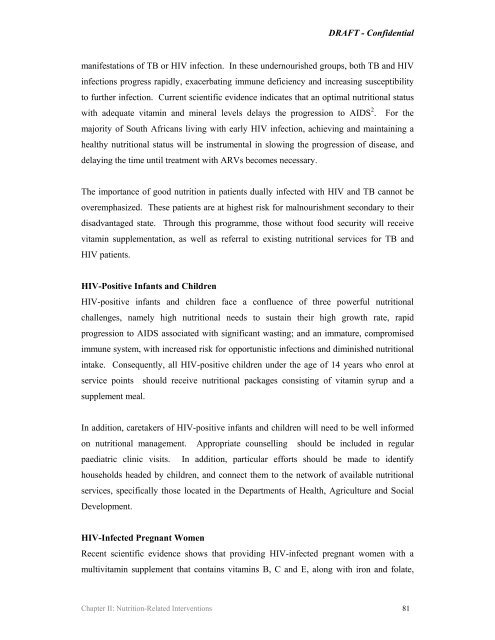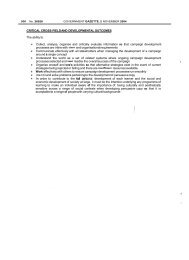Operational plan for comprehensive HIV and AIDS care and ...
Operational plan for comprehensive HIV and AIDS care and ...
Operational plan for comprehensive HIV and AIDS care and ...
Create successful ePaper yourself
Turn your PDF publications into a flip-book with our unique Google optimized e-Paper software.
DRAFT - Confidential<br />
manifestations of TB or <strong>HIV</strong> infection. In these undernourished groups, both TB <strong>and</strong> <strong>HIV</strong><br />
infections progress rapidly, exacerbating immune deficiency <strong>and</strong> increasing susceptibility<br />
to further infection. Current scientific evidence indicates that an optimal nutritional status<br />
with adequate vitamin <strong>and</strong> mineral levels delays the progression to <strong>AIDS</strong> 2 . For the<br />
majority of South Africans living with early <strong>HIV</strong> infection, achieving <strong>and</strong> maintaining a<br />
healthy nutritional status will be instrumental in slowing the progression of disease, <strong>and</strong><br />
delaying the time until treatment with ARVs becomes necessary.<br />
The importance of good nutrition in patients dually infected with <strong>HIV</strong> <strong>and</strong> TB cannot be<br />
overemphasized. These patients are at highest risk <strong>for</strong> malnourishment secondary to their<br />
disadvantaged state. Through this programme, those without food security will receive<br />
vitamin supplementation, as well as referral to existing nutritional services <strong>for</strong> TB <strong>and</strong><br />
<strong>HIV</strong> patients.<br />
<strong>HIV</strong>-Positive Infants <strong>and</strong> Children<br />
<strong>HIV</strong>-positive infants <strong>and</strong> children face a confluence of three powerful nutritional<br />
challenges, namely high nutritional needs to sustain their high growth rate, rapid<br />
progression to <strong>AIDS</strong> associated with significant wasting; <strong>and</strong> an immature, compromised<br />
immune system, with increased risk <strong>for</strong> opportunistic infections <strong>and</strong> diminished nutritional<br />
intake. Consequently, all <strong>HIV</strong>-positive children under the age of 14 years who enrol at<br />
service points should receive nutritional packages consisting of vitamin syrup <strong>and</strong> a<br />
supplement meal.<br />
In addition, <strong>care</strong>takers of <strong>HIV</strong>-positive infants <strong>and</strong> children will need to be well in<strong>for</strong>med<br />
on nutritional management. Appropriate counselling should be included in regular<br />
paediatric clinic visits. In addition, particular ef<strong>for</strong>ts should be made to identify<br />
households headed by children, <strong>and</strong> connect them to the network of available nutritional<br />
services, specifically those located in the Departments of Health, Agriculture <strong>and</strong> Social<br />
Development.<br />
<strong>HIV</strong>-Infected Pregnant Women<br />
Recent scientific evidence shows that providing <strong>HIV</strong>-infected pregnant women with a<br />
multivitamin supplement that contains vitamins B, C <strong>and</strong> E, along with iron <strong>and</strong> folate,<br />
Chapter II: Nutrition-Related Interventions 81
















